Contents

Australia
Attractions of Australia
Australia boasts a vast expanse of land and is a very popular destination for study abroad students who want to enjoy the great outdoors while still being in an urban environment. With a safe and comfortable environment, students from all over the world come to study in Australia throughout the year.
Australia is a multicultural and multinational country with a large immigrant population. Australia is also known for its friendly people, making it relatively easy for first-time students to get used to living in a foreign country.
With many world heritage sites such as the Opera House and various shopping malls, Australia is a recommended destination for those who wish to fully enjoy both sightseeing and studying abroad.
Contents
Basic Information
| Capital City | Canberra |
|---|---|
| Population | Approximately 25.75 Million |
| Climate | Summer: December to February Autumn: March to May Winter: June to August Spring: September to November |
| Currency | AUD |
| Official Language | English |
| Voltage | 220-240V, O-type (C-shaped) |
| Religions | 52% Christians, 30% Non-religious |
Attractions of Studying in Australia
The country is always ranked high in the world for safety and can be confidently recommended for those who are new to studying abroad or going abroad for the first time. Australia is also always ranked high as a popular destination for study abroad due to its collaboration of spectacular nature and modern cities.
Being a multinational country, Australia is home to people from 200 countries around the world. In an increasingly globalized world, it is a great opportunity to learn about diverse cross-cultural understanding at an advanced level.
Popular Cities
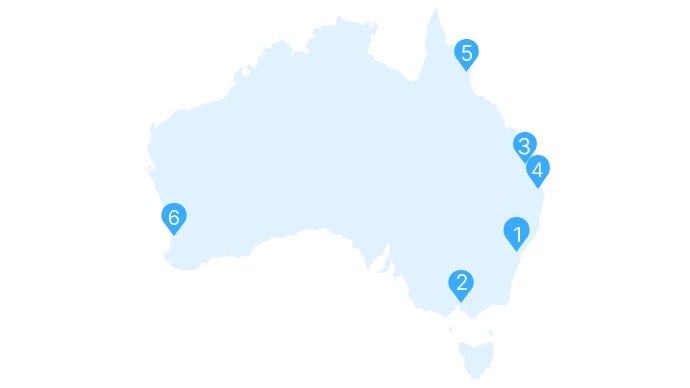
-
1. Sydney - New South Wales -
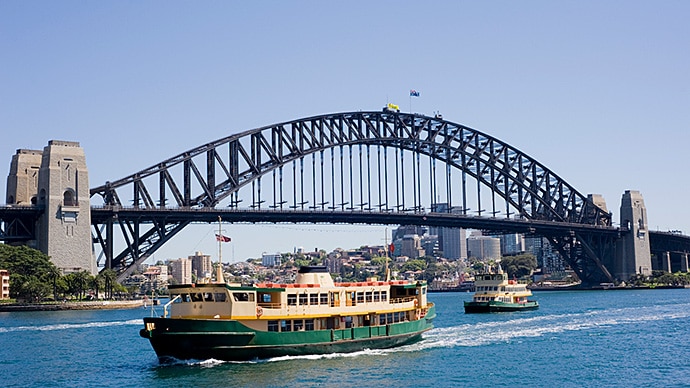 Sydney is the largest city in Australia. While being conveniently located for public transportation, it is also home to lush parks and beautiful beaches, allowing visitors to enjoy nature close at hand.
Sydney is the largest city in Australia. While being conveniently located for public transportation, it is also home to lush parks and beautiful beaches, allowing visitors to enjoy nature close at hand.
Sydney is also the most popular destination in Australia, attracting students from many countries and regions, making it a safe place for first-time students to study abroad. Prices, however, are relatively high in the urban areas of Australia, so it is important to know that the cost of living is relatively high.
[Popular Spots]
Opera House, Harbor Bridge, Bondi Beach
[Sydney Climate]
Sydney has four seasons, but they are very moderate and there are not that many days throughout the year when the temperature drops to single digits. Summer temperatures can exceed 30°C but the dry air makes for a cool and dry climate. -
2. Melbourne - Victoria -
 Melbourne is the second largest city in Australia and is known as one of the top cities in the world for ease of living. It is a city with a well-developed café culture and lush greenery, so much so that it is called the "Garden City". Melbourne is one of the most multicultural regions in Australia and is popular among those who want to experience international exchange and different cultures.
Melbourne is the second largest city in Australia and is known as one of the top cities in the world for ease of living. It is a city with a well-developed café culture and lush greenery, so much so that it is called the "Garden City". Melbourne is one of the most multicultural regions in Australia and is popular among those who want to experience international exchange and different cultures.
Melbourne is also categorized as an urban area in Australia, so it is important to note that the cost of living in Melbourne is relatively high.
[Popular Spots]
Melbourne Zoo, State Library Victoria, Queen Victoria Market, Royal Exhibition Building and Carlton Gardens, Flinders Street Railway Station, Phillip Island Nature Parks, St. Patrick's Cathedral, Brighton Beach
[Melbourne Climate]
Melbourne is located in the southeastern part of Australia, relatively close to the South Pole among Australian cities. Like Sydney, it has four moderate seasons but the difference in temperature is greater than in Sydney, with hotter summers and colder winters. -
3. Brisbane - Queensland -
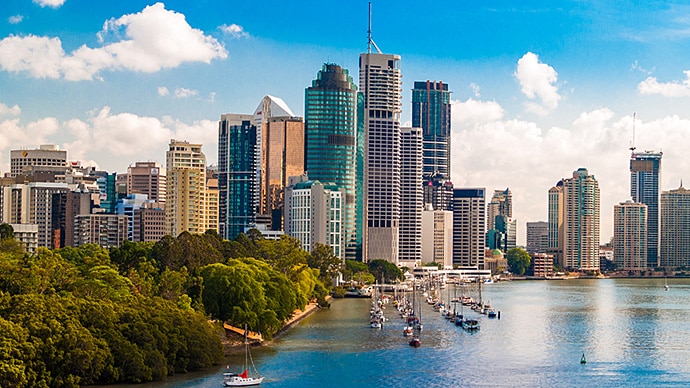 Brisbane is the third largest city in Australia. It is popular as a city of water and greenery with a mild climate and relaxed atmosphere.
Brisbane is the third largest city in Australia. It is popular as a city of water and greenery with a mild climate and relaxed atmosphere.
Compared to other cities, there are fewer tourist attractions in Brisbane but the city has a relatively large student population and a high concentration of top quality educational institutions. Brisbane is recommended for students who are eager to improve their language skills studying abroad.
[Popular Spots]
Lone Pine Koala Sanctuary, Story Bridge, Southbank Parklands, City Hall
[Brisbane Climate]
Brisbane is characterized by what is called a hot and humid climate area, with high precipitation during the summer months. The weather is very warm and comfortable with average winter temperatures above 20°C in addition to relatively sunny days throughout the year. -
4. Gold Coast - Queensland -
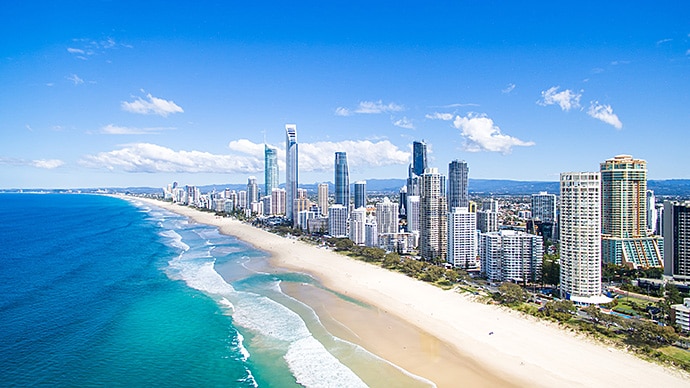 The Gold Coast lies at the tip of Australia and is a picturesque beach area with endless stretches of sandy beaches.
The Gold Coast lies at the tip of Australia and is a picturesque beach area with endless stretches of sandy beaches.
There is almost no rainfall at the Gold Coast and the area is blessed with 300 days of sunshine a year. Particularly in the summer, marine sports are popular and the entire city is full of energy.
The cost of living in Gold Coast is also lower than in major cities such as Sydney and Melbourne, making it an ideal destination for students who are considering studying abroad in Australia on a budget but still are able to enjoy the natural beauty of the country.
[Popular Spots]
Sea World, Surfers Paradise, Warner Bros. Movie World, SkyPoint Observation Deck, Wet'n'Wild Gold Coast, Tamborine National Park, Paradise Country Ranch
[Gold Coast Climate]
Characterized by a mild climate and sunny days throughout the year, the Gold Coast is relatively comfortable, with temperatures never falling below 10°C in winter. -
5. Cairns - Queensland -
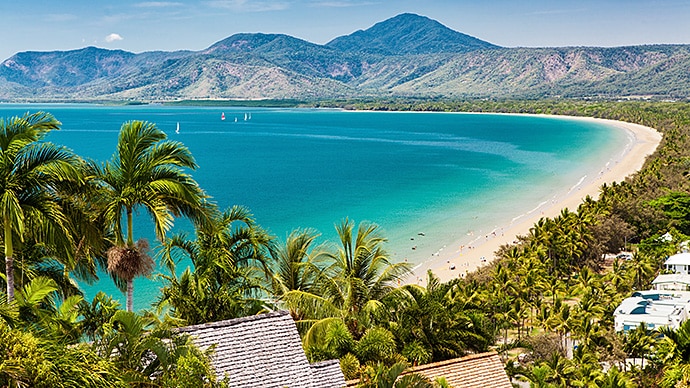 Known as the gateway to the Great Barrier Reef World Heritage Site, Cairns is visited by many tourists from all over the world throughout the year.
Known as the gateway to the Great Barrier Reef World Heritage Site, Cairns is visited by many tourists from all over the world throughout the year.
Cairns is also characterized by its mild and comfortable climate, with no drastic variations in temperature throughout the year.
Highly recommended for people who are anxious about studying abroad for the first time and want to learn English while experiencing the closeness to nature in a relaxing environment.
[Popular Spots]
Great Barrier Reef, Kuranda, Rainforestation Nature Park, Cairns ZOOM and Wildlife Dome
[Cairns Climate]
Cairns is classified as having a tropical monsoon climate. There are no four distinct seasons, and the climate is divided into wet and dry seasons.
The rainy season is from December to April, and the dry season is from January to March, with January being the hottest month.
As Australia is said to have the highest amount of ultraviolet rays in the world, it is imperative to take more UV precautions than usual. -
6. Perth - Western Australia -
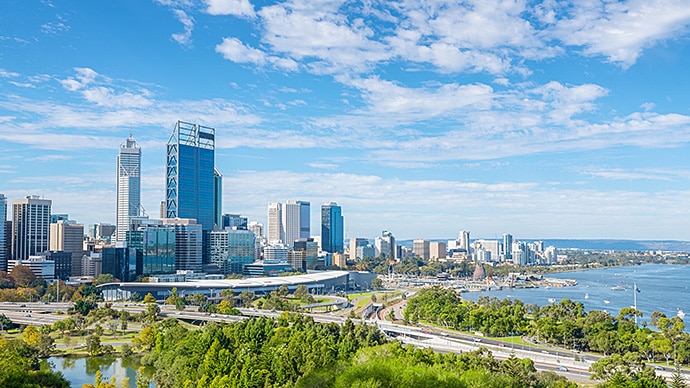 Located on the west coast of Australia, Perth is one of the most populous cities in the country. Major Australian cities such as Sydney and Melbourne are concentrated on the coastal side of the country, and Perth is one of the cities that has grown so much in recent years and is now known as Australia's fourth largest city.
Located on the west coast of Australia, Perth is one of the most populous cities in the country. Major Australian cities such as Sydney and Melbourne are concentrated on the coastal side of the country, and Perth is one of the cities that has grown so much in recent years and is now known as Australia's fourth largest city.
Though Sydney and Melbourne have a strong image as destinations for study abroad in Australia, Perth is in fact a hole-in-the-wall destination that attracts international students from all over the world. Western ambience can be enjoyed throughout Perth as it is a beautiful city that combines the futuristic urban areas that have developed in recent years along with a western flavor that is rich in history.
[Popular Spots]
Kings Park and Botanic Garden, The Pinnacles Desert, Cottesloe Beach, Rottnest Island, Fremantle, Wave Rock
[Perth Climate]
Perth has four distinct seasons, with very hot and dry summers. Winters, conversely, are mild and cold, but precipitation increases during the winter months, with occasional heavy thunderstorms.
Living in Australia
Climate
Most cities have four seasons and the climate is mild throughout the year with an average temperature of about 18 °C. Australia also has a thin ozone layer, making the country susceptible to ultraviolet rays.
Sunscreen and sunglasses are essential, especially in the summer months.
Prices
Prices in Australia tend to be a bit high overall. Particularly, the value of water is very high because Australia does not get a lot of rainfall. Staple foods such as rice, bread and wheat are relatively cheap and can be purchased at reasonable prices, so it is possible to economize by cooking and bringing lunch boxes.
Note: Prices vary from city to city.
Public Order
Compared to other countries around the world, Australia is considered a popular and safe place to study. Gun control is strict, which makes it safer than other countries in Europe and America, but you should take precautions against pickpocketing and luggage theft. We also recommend that you avoid walking alone at night if possible.
Theft rates are high especially in crowded urban areas. Although security is considered safe from a global perspective, it is still best to be vigilant.
Estimated Cost of Study Abroad
Before Departure
| Total Amount | USD 997〜1,645 |
|---|---|
| Air Ticket (Round Trip) | USD 828〜1,419 |
| Insurance (Study Abroad Insurance) | USD 169〜226 |
After Departure
| Total Amount | USD 1,648〜2,387 |
|---|---|
| School (Tuition Fee) | USD 782〜908 |
| Accommodation Fees | USD 530〜808 |
| Living Expenses | USD 336〜671 |
* The cost of airline tickets varies depending on the departure and arrival airports.
* Tuition and accommodation fees vary from school to school.
* Post-arrival expenses vary from person to person.




